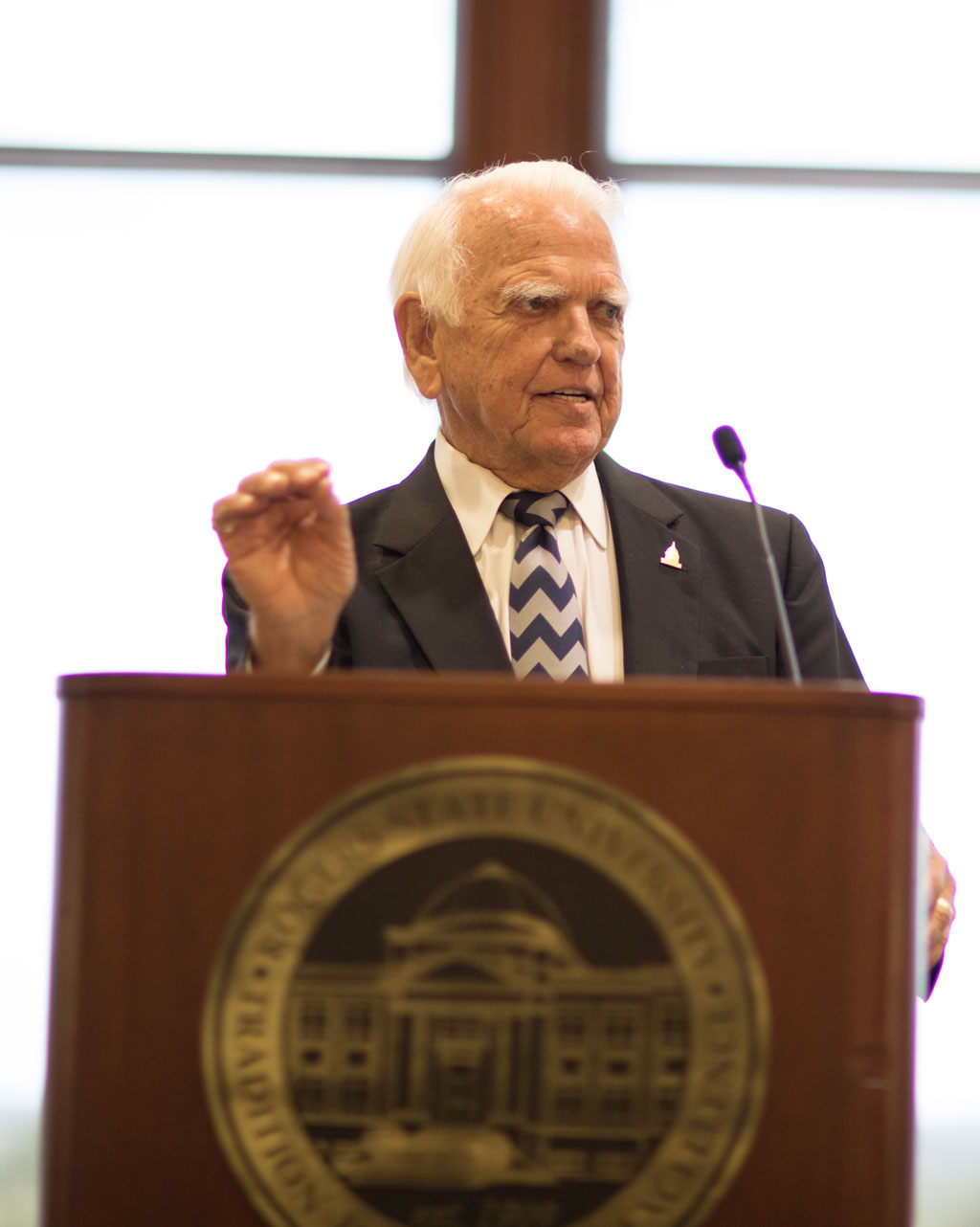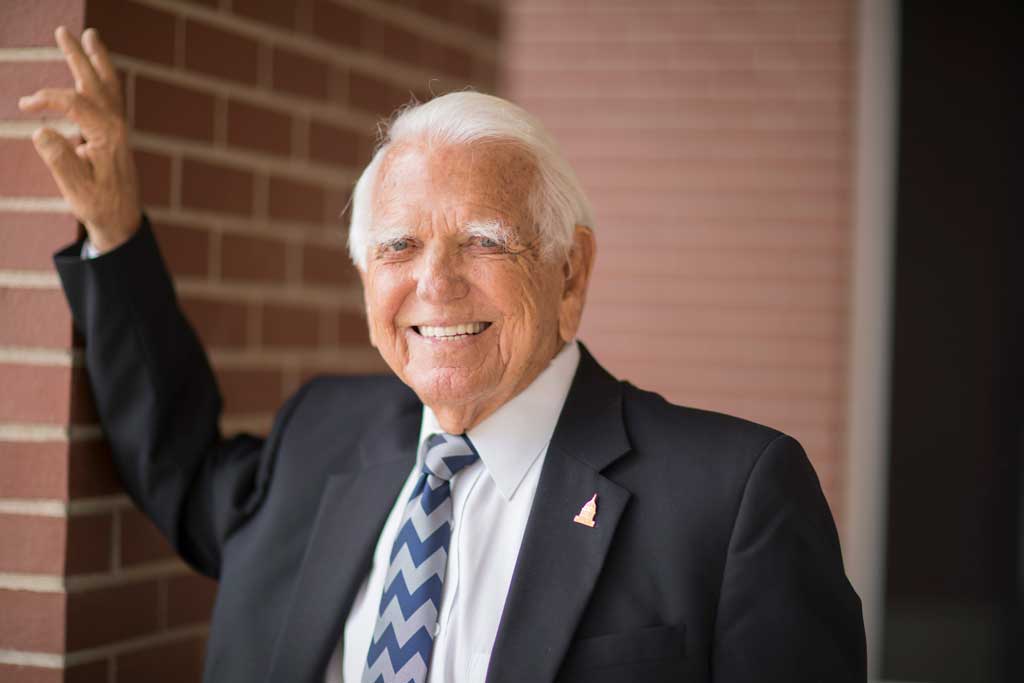
George Nigh, at 90, Still Laughs and Lives in a Bipartisan Way
The hair is all white; the facial lines are deep. He is 90, after all. But the enthusiasm, humor and passion that have defined George Nigh’s public life endure.
And at an age when some scoff at yet another milestone or celebration, Nigh – typically – cracks a joke.
“I always look forward to birthdays,” he says. “I want ’em to come around. I say, `You bet I’ll see you next year.’ What’s funny is that I was the youngest member of the state legislature when I was elected in 1950. Now I’m the old guy.”
That’s why he found it hilarious when he opened his mailbox and saw a birthday card from a friend literally addressed to George Nigh-ty … a man who keeps a schedule that requires the endurance and energy of someone 60 or more years younger than he.
Nigh is on the road constantly; he delivers more than 100 speeches – at no charge – each year. He never turns down an invitation to speak with students because, at heart, he remains a 23-year-old Oklahoma history teacher who eventually became the state’s longest serving governor and lieutenant governor.
Life after Politics
Nigh’s love for education guided him after he departed from the statehouse in 1987. He took the apolitical position of statesman-in-residence at the University of Central Oklahoma in Edmond – with no strings attached.
“I had no employment lined up when I left,” he says. “Henry Bellmon had done the statesman-in-residence before me. He was one of the best governors we’ve ever had and he was a Republican. I’m a Democrat, so that position is by definition nonpartisan.”
In five years in that office, Nigh presented lectures and lined up influential speakers from both major parties, including President Bill Clinton and Tennessee political veteran Lamar Alexander.
I insisted on applying for the job, not having it given to me.
UCO President Bill Lillard retired in 1992, but Nigh didn’t have further aspirations.
“I had no earthly idea that I’d become the next president,” he says. “Donna [his wife of 54 years] and I were driving back from vacation when we got a call that I was in line to become president. We were in shock.
“But we were in the mountains between Tennessee and Oklahoma, so we had a few days to think. Eventually, we thought it’d be great. It was natural for both of us, so I applied. And I insisted on applying for the job, not having it given to me.”
He also would only take the job if UCO’s board of regents, with six Democrats and six Republicans, unanimously approved his hiring. It was a slam dunk.
Nigh guided UCO until 1997, when he retired from public office a second time. He’s now on his third career as a public speaker and public relations face for the International Bank of Commerce, which funds much of his travel.
Working with Friends and Foes
Nigh chuckles that he has not been contacted by the University of Oklahoma to succeed David Boren – another former governor, one whom Nigh served as lieutenant governor – as president.
“David’s done an outstanding job at OU, in addition to all his contributions to the state,” Nigh says. “When he was governor [1975-1979], he and I became good friends. When I first became lieutenant governor [in 1959], it was a part-time job. As governor, David encouraged me to be more active and supported making it a full position.
“I had a half-time secretary and hardly any staff. It took a while to become fully staffed, but David was a big part of it. He assigned me security for the first time. He put me on a bunch of committees and I filled in for him at meetings.”
I worked as bipartisan as possible by keeping issues nonpolitical. I’m very proud of that. That shows how working across party lines can go. I’m a Democrat, but first I’m an Oklahoman.
Nigh laments that today’s political atmosphere often prevents people from even talking with each other. Nigh got along with most politicians from both sides of the aisle and has been the only governor to carry all 77 counties in Oklahoma during an election. However, he did have his clashes, some with Republican Dewey Bartlett Sr., governor from 1967 to 1971, while Nigh was in his third term as lieutenant governor.
“Bartlett and I had our differences and we publically didn’t do well with them,” Nigh says. “But it was Dewey who said we needed to sit down and talk.”
What resulted was a growing trust between the two, dictated by common interests. This eventually led to a statewide career technology program, with the Francis Tuttle (Oklahoma City) and Tulsa technology centers as its modern descendants. Bartlett also tapped Nigh to develop the state film commission, which has brought exposure and production income to Oklahoma.
“I worked as bipartisan as possible by keeping issues nonpolitical,” Nigh says. “I’m very proud of that. That shows how working across party lines can go. I’m a Democrat, but first I’m an Oklahoman.”


























